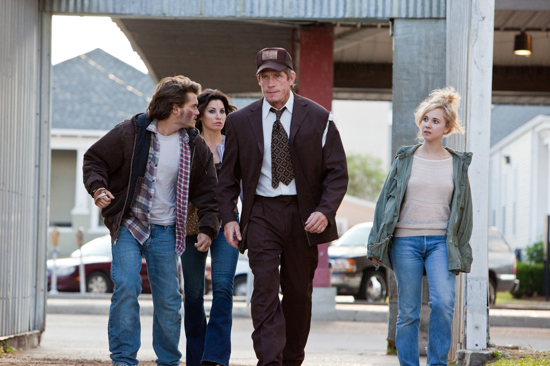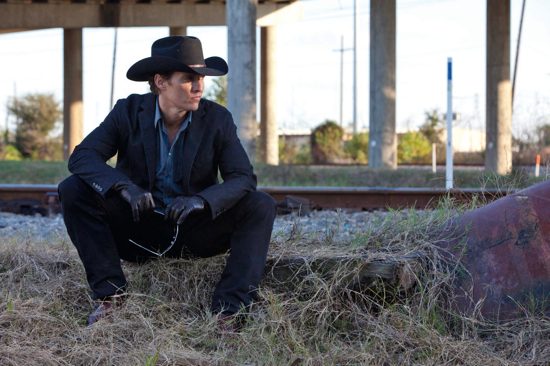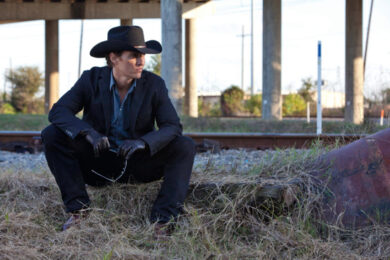The latest movie from 1970s-era auteur William Friedkin (The French Connection, The Exorcist, Cruising) is a bold and challenging affair, not often in the most subtle or easy to defend manner, but undoubtedly in a way which affirms a very late career renaissance – he’s 76 years old – guided by the pen of Pulitzer Prize-winning Chicagoan playwright Tracy Letts. While Friedkin’s muse throughout the 1990s and early 2000s was directed towards TV movie filler and unheralded thrillers such as Jade and Tommy Lee Jones starrers Rules Of Engagement and The Hunted, his 2006 adaptation of Letts’ punishing Bug marked a step into the unknown.
In many respects Killer Joe, which had its UK premiere at the Edinburgh International Film Festival, is an easy sell. Casting slightly weathered but still enviably chiselled heartthrob Matthew McConaughey in the titular role of ‘Killer’ Joe Cooper, a taciturn and somewhat creepy Texan cop moonlighting as a contract killer, Friedkin has the element of surprise on his side – just how depraved a character has McConaughey signed up for? – while his leading man is afforded a prime opportunity to rewrite our expectations of him in much the same manner as Robert Mitchum managed in The Night Of The Hunter.
It’s a film which revels in its unashamedly down at heel setting. Friedkin and his cinematographer Caleb Deschanel linger on shots of lazy railroad trains honking by and deserted, decrepit games rooms where beer-swilling men gather to arrange murders, of cheaply furnished trailer homes and litter-strewn, under-freeway waste ground where loan sharks conduct savage beatings. The milieu is constructed… well, perhaps beautifully isn’t the word, but certainly with an immersive truth.
The characters, meanwhile, are blessed with the kind of bland ridiculousness which is found most readily in real life. Emile Hirsch is Chris Smith, a bright-eyed young loser whose self-envisaged ability to charm his way out of any situation is embarrassingly shown up by the array of people who want to cause him serious bodily harm. Thomas Haden Church is a touch of lumbering class as Chris’ dim-witted, leather-skinned father Ansel, a man who breezily admits "I’m never aware" as violent tension escalates around him. Ansel’s wife is Sharla, played by a similarly magnetic Gina Gershon, a woman whose cagey swagger appears to be informed both by the striking beauty of her youth and her charm’s near-failure through age.
When Chris blunders into real threats of serious violence by running up gambling debts with a redneck raconteur, the trio hatch a plan to have the young man’s mother – Ansel’s ex-wife – murdered in order that they can claim on her insurance policy. So they employ Cooper, Chris once again ignoring the obvious warnings life throws at him as the murderer fixes him with a marrow-shrivelling gaze and informs him: "This is serious business you’re fuckin’ with, boy."
Chance to get out unheeded, Chris and his dad agree to a seedy Faustian pact which allows Cooper to have their respective sister and daughter Dottie (Juno Temple, daughter of punk director Julien) as a "retainer" in lieu of a cash deposit, an arrangement which essentially prostitutes the teen.

As a thriller this is not groundbreaking but it’s certainly involving, the dramatic tension coming not from our desire that these characters avoid harm, but through a rubbernecking curiosity as to just how much they’ll manage to despoil their lives through base greed and stupidity. Letts’ play, his debut, is a near-contemporary of Sarah Kane’s work, but while the piece does descend into an unremitting assault on taboo towards the end, the fact that the original stage production debuted a year after Reservoir Dogs is perhaps more pertinent. Friedkin’s movie is deserving of the description Tarantinoesque: a fast-moving grotesquery of sharp talkers, slow wits and unpleasant trailer trash types who have been inured to popcorn violence.
At heart it seems to be a hateful piece, but the focus of this hatred isn’t just women, or unskilled blue-collar workers, or those who live in Texan poverty in a state which is "just a bunch of hicks and rednecks with too much space to walk around in." It’s everyone – their greed and venality and desensitisation to violence a putrid cocktail of all-American corruption.
Only Dottie, performed with sublime subtlety by Temple, rises above it all, simply because her youthful innocence hasn’t quite managed to sink amid the corruption. For all that a soon to be infamous scene with a chicken drumstick will be the one whose unsavoury image remains in the popular memory, her seduction by Cooper – McConaughey emitting controlled sleaze, Temple finding and keeping hold of Dottie’s innocent sense of romance throughout – is the point at which this satisfactory film finds its heart.



